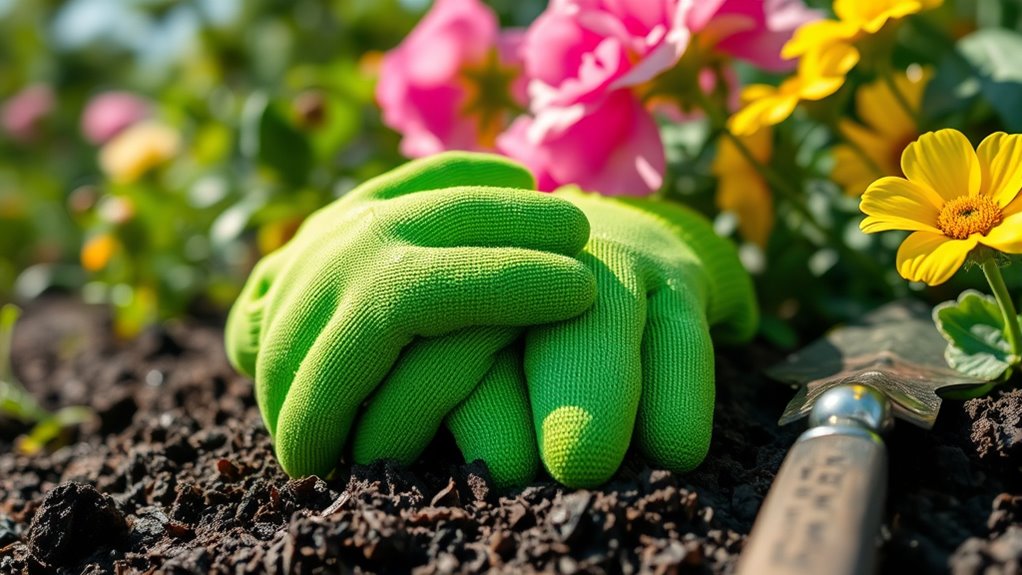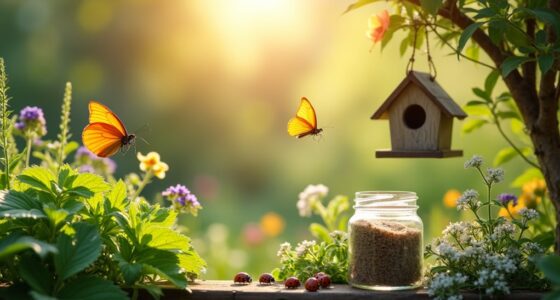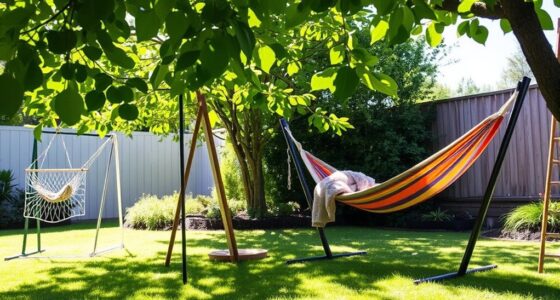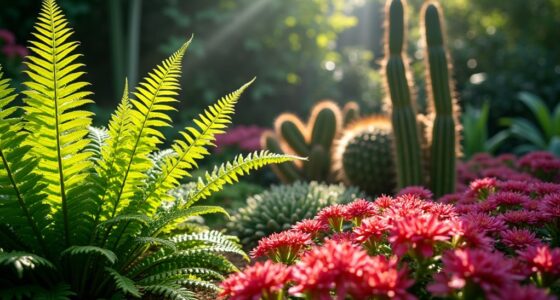Wearing gardening gloves is vital for your safety. They protect your hands from infections like tetanus, sepsis, and harmful bacteria found in soil. Gardening gloves also guard against respiratory risks like legionellosis and skin infections such as melioidosis and rose gardener’s disease. A good pair of heavy-duty gloves guarantees comfort while shielding you from cuts and blisters. Want to know more about choosing the right gloves and their other benefits? Keep going to find out!
Key Takeaways
- Gardening gloves protect hands from cuts and scrapes, minimizing the risk of infections from soilborne bacteria like E. coli and Salmonella.
- Wearing gloves reduces exposure to harmful pathogens such as Legionella bacteria found in soil and potting mix, preventing respiratory issues.
- Gloves serve as a barrier against chemicals and irritants in soil, protecting skin from irritation and allergic reactions.
- They prevent serious infections from bacteria like Burkholderia pseudomallei and Sporothrix fungus, which can enter through skin abrasions.
- Heavy-duty gloves enhance comfort and dexterity while providing durability and protection during various gardening tasks.
Protection Against Tetanus
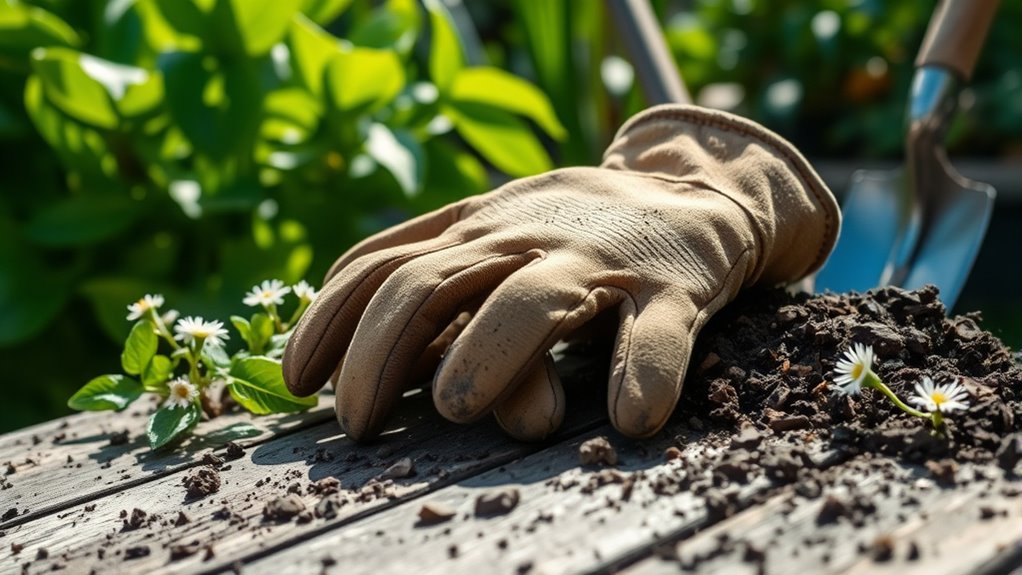
When you dig into your garden, you’re not just cultivating plants; you’re also exposing yourself to potential hazards like tetanus. This serious infection, caused by the Clostridium tetani bacteria found in soil and manure, can enter your body through cuts and scrapes.
Wearing gardening gloves offers important protection against these injuries, greatly reducing your risk of infection. Most people vaccinated against tetanus can fight it off, but staying up to date with your vaccinations is essential, especially for avid gardeners like you. Additionally, understanding the importance of emergency preparedness essentials can help you make informed decisions about safety while gardening. Regularly checking for scratching posts in your gardening area can also help minimize the risk of cuts from sharp tools or plants. Utilizing basic first aid knowledge can further enhance your safety measures in the garden. Furthermore, keeping your gardening tools clean can prevent orange juice spoilage from contaminating any open wounds. It’s also wise to familiarize yourself with camping safety gear to ensure you’re prepared for any outdoor activity that may arise during gardening.
Early symptoms can appear within 7 to 10 days, so prompt medical attention is necessary if you get hurt. Prioritizing safety by using gloves is a simple yet effective way to enjoy gardening while minimizing health risks.
Prevention of Sepsis
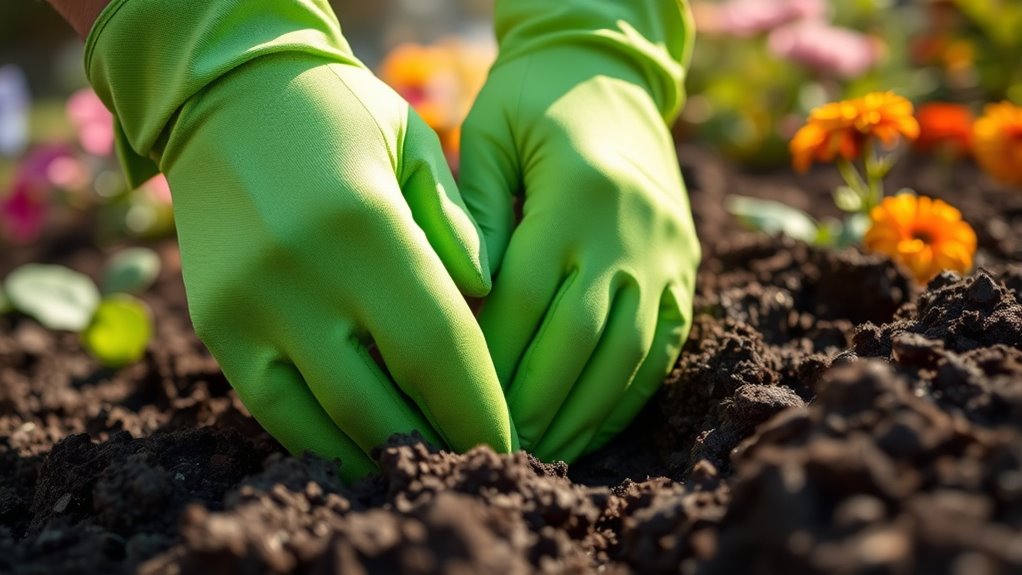
When you’re gardening, it’s easy to overlook the hidden dangers lurking in the soil, like harmful bacteria that can cause serious infections. If bacteria enter your bloodstream, it can lead to sepsis, a life-threatening condition that needs quick treatment. Wearing gardening gloves not only protects your hands but also minimizes the risk of injuries that could introduce these infections. Additionally, it’s crucial to be aware of the importance of protecting your skin from potential irritants in the soil while gardening. Proper hand protection can also help you avoid contact with primitive weapons that may be present in your gardening area, which can pose additional risks. Furthermore, wearing gloves can prevent exposure to harmful bacteria that might be found in the soil, reducing your chances of infection. Using gloves can also help you steer clear of contamination risks associated with gardening tools and equipment, which may harbor dangerous pathogens. Engaging in gardening without gloves can increase your likelihood of impulsive behaviors, leading to cuts and scrapes that could introduce harmful bacteria into your system.
Bacterial Infection Risks
Gardening can be a rewarding hobby, but it also comes with hidden risks, particularly from bacterial infections that could lead to sepsis. Bacteria like E. coli and Salmonella thrive in soil, and a simple cut or scrape can expose you to serious infections. Regularly handling plants such as broccoli farming can increase your risk if proper precautions aren’t taken. Additionally, being aware of smart shopping techniques can help you save money on gardening supplies, allowing you to invest in quality gloves and other protective gear. Routine maintenance, like preventive care, can also help keep your gardening tools and environment safe from bacteria. Engaging in activities that promote emotional well-being can provide you with a balanced perspective on the importance of safety while gardening.
| Bacteria | Risks | Prevention |
|---|---|---|
| E. coli | Severe abdominal issues | Wear gloves, clean wounds |
| Salmonella | Gastrointestinal infections | Quick medical attention |
| Listeria | Serious illness | Maintain proper hygiene |
| General Soil | Bacterial exposure | Use hand protection |
Wearing gloves during gardening activities not only protects your hands but also minimizes exposure to harmful bacteria. Additionally, understanding financial considerations for elderly care is crucial, as serious infections can lead to unexpected healthcare costs. Remember, proper hygiene practices are essential in preventing serious health issues like sepsis.
Quick Treatment Necessity
Wearing gardening gloves not only shields your hands from harmful bacteria but also plays a significant role in preventing serious health issues like sepsis.
When you garden, cuts and abrasions can easily occur, allowing bacteria like E. coli and Salmonella to enter your bloodstream. This can lead to severe infections and, if left untreated, progress to sepsis or septic shock, which can be fatal. Early detection of infections is crucial, as symptoms such as fever and confusion can indicate a serious condition. Emotional coldness can arise during recovery from health scares, making it important to seek support. Additionally, ensuring proper airflow around your gardening area can help reduce exposure to harmful pathogens. Understanding the importance of emotional support during recovery can also aid in managing the psychological effects of health scares.
By using gloves and promptly cleaning any injuries, you can take effective preventative measures against these risks. Additionally, understanding the importance of good grief can help you manage emotional responses related to health scares and injuries.
Educating yourself on the symptoms of sepsis, such as fever and confusion, is essential for early detection and treatment.
Avoiding Legionellosis
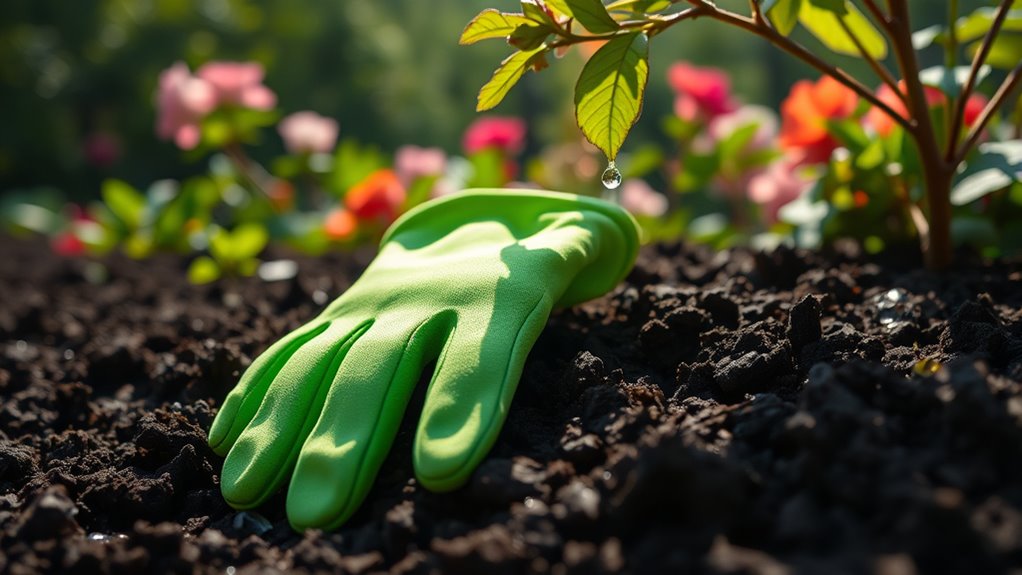
When you work with soil and potting mix, you might be exposing yourself to Legionella bacteria, which can lead to serious respiratory issues. To protect yourself, wearing gardening gloves and a dust mask is key to minimizing your risk of inhaling harmful particles. Dampening the soil before handling it can further reduce dust exposure and keep you safer while gardening. Additionally, understanding the importance of family and elderly support can help you navigate the challenges of caregiving while enjoying your gardening activities. Implementing proper estate planning measures can also provide peace of mind as you manage your gardening and caregiving responsibilities. Regular use of air purifiers can significantly improve indoor air quality, reducing the presence of harmful particles in your environment. For those concerned about allergens, using best HEPA filter vacuums in your home can help eliminate dust and improve overall air quality.
Soil Contamination Risks
While you may enjoy the therapeutic benefits of gardening, it’s crucial to recognize the potential soil contamination risks that come with it, particularly the threat of legionellosis.
The bacterium Legionella longbeachae, found in potting soil, poses a serious risk, especially when you’re inhaling harmful spores while handling potting mix.
To protect yourself, consider these practices:
- Always wear gloves when handling potting soil.
- Use a dust mask to prevent inhalation of spores.
- Dampening soil before working minimizes dust.
- Maintain proper hygiene practices, washing hands afterward.
- Utilize protective gear for added safety.
Protective Measures Required
To effectively avoid the risks of legionellosis while gardening, you must prioritize protective measures that safeguard your health.
Start by wearing gloves when handling potting soil, as this greatly reduces your risk of inhaling dust and spores that may contain Legionella longbeachae.
Before you dig in, dampening soil can minimize airborne particles, further decreasing the chance of inhaling harmful pathogens.
It’s crucial to maintain proper hygiene by washing your hands after gardening and using protective gear like masks when necessary.
These preventative measures not only help prevent infections associated with contaminated potting mix but also guarantee you enjoy gardening safely.
Guarding Against Melioidosis
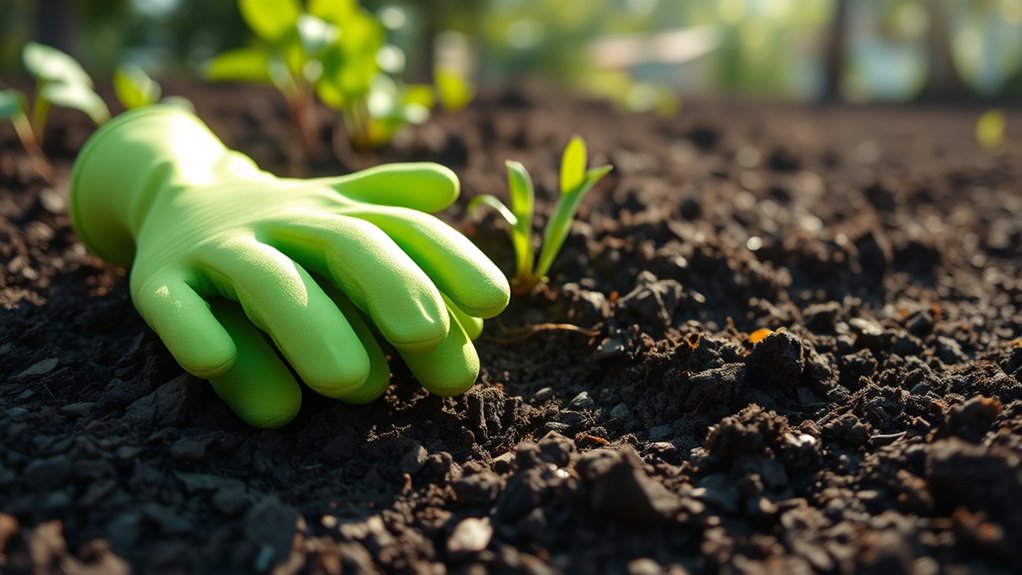
Since gardening often involves handling soil, it’s crucial to guard against melioidosis, a serious infection caused by the Burkholderia pseudomallei bacteria. This bacteria can enter your body through cuts and scrapes, posing a significant risk.
To protect your hands and reduce the chances of infections, consider these preventative measures:
- Always wear gardening gloves to shield your skin.
- Use waterproof boots when working in muddy areas.
- Avoid gardening during heavy rain, especially if you have a weakened immune system.
- Be cautious of contaminated soil, particularly in high-risk regions.
- Monitor for symptoms like cough, fever, or confusion after exposure.
Reducing Risk of Rose Gardener’s Disease
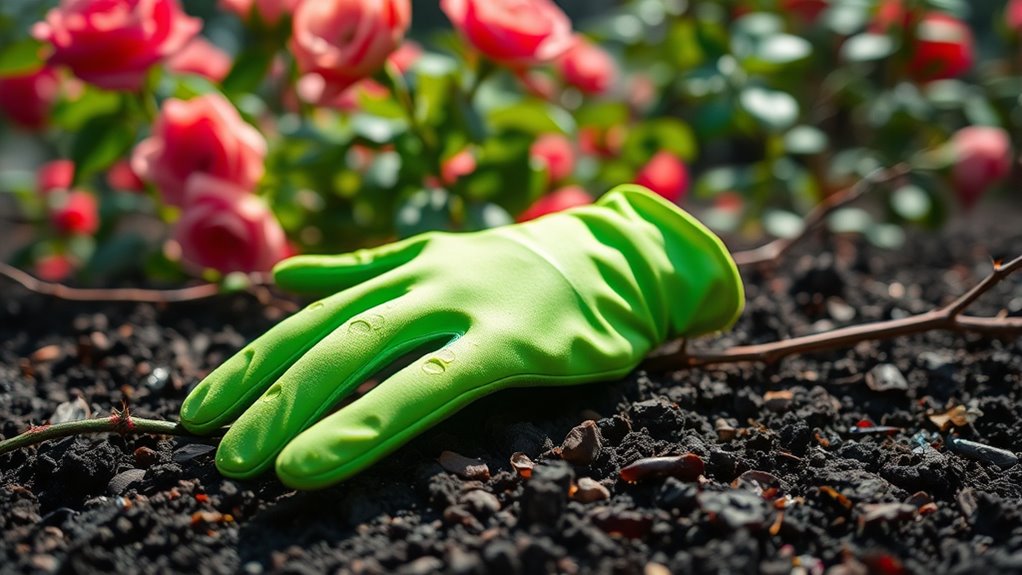
Gardening can expose you to various risks, including infections from soilborne pathogens. One of these is Rose Gardener’s Disease, caused by the Sporothrix fungus that can enter through cuts or abrasions. Using gardening gloves is a simple yet effective way to prevent skin exposure to this fungus and other harmful pathogens.
| Risks | Protective Measures |
|---|---|
| Cuts and abrasions | Wear gardening gloves |
| Fungus infections | Keep gloves clean and dry |
| Serious complications | Inspect gloves for damage |
| Soilborne pathogens | Use gloves when handling plants |
| Weakened immune systems | Choose gloves with good grip |
Importance of Heavy Duty Gardening Gloves
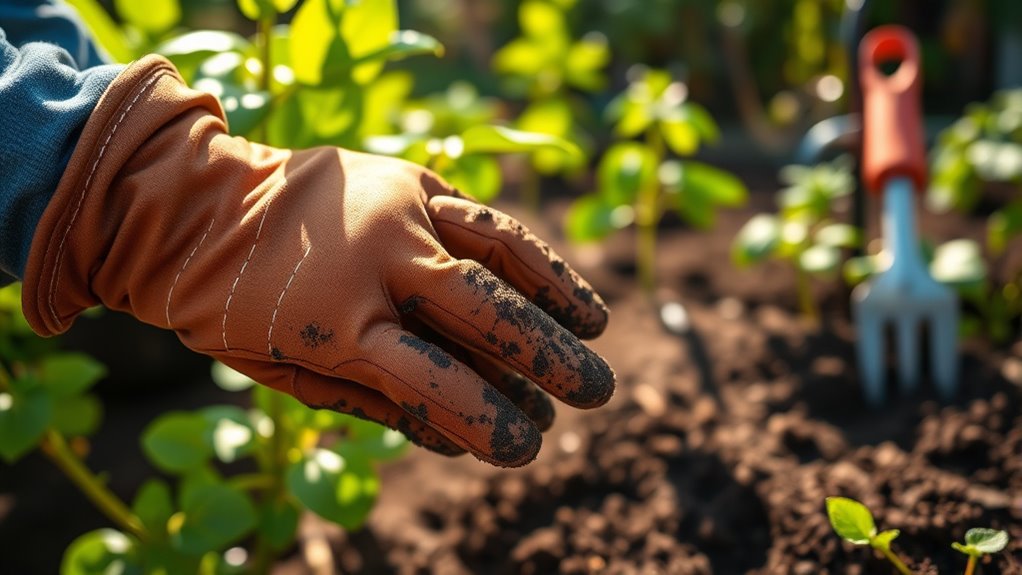
Heavy duty gardening gloves are vital for protecting your hands while you work outdoors.
These gloves not only shield your skin from cuts and scratches but also reduce the risk of infections from soil pathogens. They provide a significant barrier against chemicals, safeguarding you from skin irritation and allergic reactions.
Here are some key benefits of using heavy duty gardening gloves:
- Protect hands from thorn pricks and splinters
- Reduce risk of mechanical dangers during tasks
- Enhance comfort by preventing calluses and blisters
- Guarantee safety while handling tools and materials
- Offer durability for long-lasting protection
Investing in heavy duty gardening gloves means you can work confidently, knowing your hands are safe and comfortable throughout your gardening endeavors.
Selecting the Right Gardening Gloves
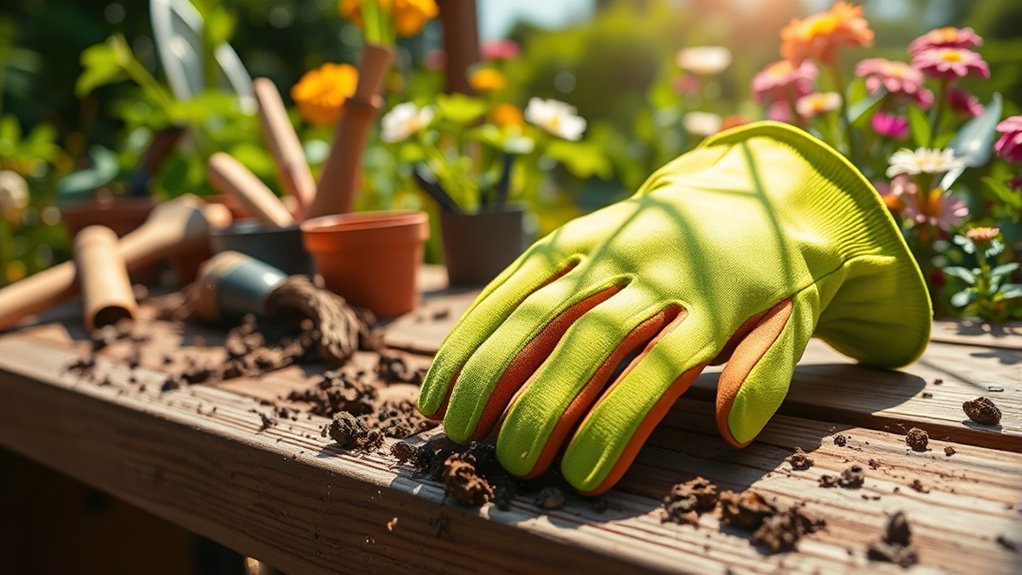
Choosing the right gardening gloves can make a significant difference in your overall experience, especially when tackling various tasks in the garden. You’ll want gloves that fit snugly for dexterity, offering protection against cuts while handling sharp tools. For heavy lifting, opt for gloves that provide support to prevent strain. Assess comfort and durability through customer reviews, guaranteeing they withstand moisture and chemical exposure.
| Task Type | Recommended Gloves |
|---|---|
| Sharp Tools | Heavy-duty, cut-resistant |
| Thorny Plants | Thick, puncture-proof |
| Delicate Tasks | Lightweight, flexible |
| Heavy Lifting | Supportive, padded |
| General Gardening | Durable, high-quality materials |
Investing in high-quality materials guarantees longevity and safety in your gardening adventures.
Frequently Asked Questions
Why Should You Wear Gloves When Gardening?
You should wear gloves when gardening to protect your hands from cuts, scrapes, and irritants.
Gloves keep harmful soil pathogens and bacteria at bay, reducing your risk of infections. They also shield you from allergens in certain plants and hazardous chemicals from pesticides.
Plus, wearing gloves prevents blisters and calluses, helping you stay comfortable while you work.
Is It Healthy to Garden Without Gloves?
Gardening without gloves isn’t the healthiest choice for you. You expose your hands to potential infections and injuries from thorns, sharp tools, or pests.
Soil can harbor harmful bacteria, increasing your risk of serious health issues. Without gloves, you might also trigger allergic reactions or skin irritations from plants.
What Are Three Reasons to Wear Gloves?
You should wear gloves while gardening for several key reasons.
First, they protect your hands from cuts and scratches, especially when dealing with thorns or sharp tools.
Second, gloves act as a barrier against harmful bacteria in the soil, keeping your skin safe.
Finally, they prevent skin irritations and allergic reactions from plants or chemicals, allowing you to focus on your gardening tasks without discomfort.
Enjoy your time in the garden while keeping your hands safe!
What Bacteria Can You Get From Gardening?
Did you know that up to 20% of soil can contain harmful bacteria? While gardening, you can encounter bacteria like E. coli and Salmonella, especially if you use animal manure.
Clostridium tetani lurks in soil, ready to enter through cuts, while Legionella longbeachae can cause serious respiratory issues.
Additionally, Burkholderia pseudomallei can infect you through skin abrasions. It’s essential to stay aware of these potential dangers while working with soil and plants.
Conclusion
To sum up, wearing gardening gloves isn’t just about comfort; it’s essential for your health. You might think, “I’ve gardened without them for years,” but even small cuts can expose you to serious infections like tetanus and sepsis. By choosing the right gloves, you’re not only protecting yourself from harmful bacteria and diseases, but also ensuring a safer, more enjoyable gardening experience. So, don’t skip this simple step—your hands will thank you, and so will your garden!
